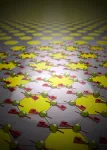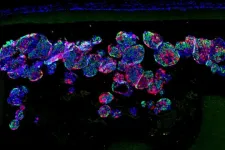INFORMATION:
Blood clot-busting nanocapsules could reduce existing treatment's side effects
2021-06-02
(Press-News.org) Tested on human blood in the lab, the selective nanocapsules could reduce the side effects of a major blood clot dissolving drug, which include bleeding on the brain. If confirmed with animal tests, the nanocapsules could also make the drug more effective at lower doses.
Blood clots, also known as thrombi, are a key cause of strokes and heart attacks which are leading causes of death and ill-health worldwide. They can be treated with a clot dissolving drug called tissue plasminogen activator (tPA) which disrupts clots to clear the blocked blood vessel and re-establish blood flow.
However, tPA can cause life-threatening off-target bleeding, and lasts only a few minutes in circulation, so often requires repeated doses, which further increases the risk of bleeding. Consequently, it is only used for a minority of potentially eligible patients.
Now, researchers at Imperial College London have found that by encasing tPA in newly designed tiny capsules, it can be targeted more specifically to harmful blood clots with an increased circulation time. They designed the nanocapsules to attach to activated platelets present in thrombi, release the tPA payload and dissolve clots.
Lead author Dr Rongjun Chen of Imperial's Department of Chemical Engineering said: "tPA has a narrow window between desired effect and side effects, so we have wrapped it in a package that extends this therapeutic window and minimises the required dose. Our results are exciting but animal and clinical studies are required for validation."
Blood clots are made of blood cells called platelets which link together when activated. These platelets are held together with proteins called fibrinogen which bind to activated platelets and form 'bridges' between them. The new nanocapsule, called tPA-cRGD-PEG-NV, mimics fibrinogen so that it seeks out clots within blood vessels.
The researchers tested this on healthy human blood under both static conditions, where still blood was tested in petri dishes, and physiological flow conditions in a simulated blood vessel. To test flow conditions, they designed a computer model to simulate how the encapsulated tPA might act in circulating blood.
They found that the nanocapsules were highly selective in binding to activated platelets and that the time it took to dissolve clots was similar to that with unencapsulated tPA.
Co-corresponding author Professor Xiao Yun Xu of Imperial's Department of Chemical Engineering said: "We combined experimental and computational work to characterise this nanocapsule. To build our computer model we needed a mechanistic understanding of the interplay between the physical and biochemical processes of blood clot dissolving. The model could be very useful in animal and clinical trials of this potential nanomedicine, as well as in predicting optimal dosing for patients."
The purpose-built computer model was able to simulate nanocapsule transport to the clot site, its release of tPA, and its dissolution of clots. Professor Xu added: "Our simulation illustrated the potential in predicting the outcome of blood clot treatments in clinically relevant scenarios."
Co-author Professor Simon Thom of Imperial's National Heart and Lung Institute said: "We've found a way to make a clot-busting drug more precisely targeted, potentially enhancing efficacy and reducing catastrophic side effects. This promising work demonstrates the activity of nano-encapsulated tPA in a laboratory setting and paves the way for safer delivery of drugs with otherwise harmful side effects. Research is now needed in whole organisms to determine the capsule's effectiveness in a more realistic setting."
Next the researchers will test the encapsulated tPA in animals to see how it performs in whole organisms, especially for increasing circulation time and checking the computer model's ability to predict clot busting in a realistic setting. Dr Chen added: "Once fully validated, the selective nanocapsules and the computer model could serve as powerful platforms for developing clot-busting nanomedicines."
ELSE PRESS RELEASES FROM THIS DATE:
Can echolocation help those with vision loss?
2021-06-02
Known as nature's own sonar system, echolocation occurs when an animal emits a sound that bounces off objects in the environment, returning echoes that provide information about the surrounding space.
While echolocation is well known in whale or bat species, previous research has also indicated that some blind people may use click-based echolocation to judge spaces and improve their navigation skills.
Equipped with this knowledge, a team of researchers, led by Dr Lore Thaler, of Durham University, UK, delved into the factors that determine how people learn this skill.
Over the course of a 10-week training programme, the team investigated how blindness and age affect learning ...
Shining light on two-dimensional magnets
2021-06-02
Atomically thin van der Waals magnets are widely seen as the ultimately compact media for future magnetic data storage and fast data processing. Controlling the magnetic state of these materials in real-time, however, has proven difficult. But now, an international team of researchers led by Delft University of Technology (TU Delft) has managed to use light in order to change the anisotropy of a van der Waals antiferromagnet on demand, paving the way to new, extremely efficient means of data storage.
The thin atomic layers that make up van der Waals magnets may seem extremely fragile, but they can be about 200 times stronger ...
US conservatives less able than liberals to distinguish truth from falsehoods in study of responses to 20 political news stories
2021-06-02
In a six-month study of more than 1,000 Americans, R. Kelly Garrett and Robert Bond found that U.S. conservatives were less able to distinguish truth from falsehoods in 20 viral political news stories that appeared online between January and July 2019. Differences in the political orientation of these stories may help explain this observation, the researchers note, writing that "we find that high-profile true political claims tend to promote issues and candidates favored by liberals, while falsehoods tend to be better for conservatives." Two-thirds (65%) of the high-profile true stories were characterized as benefiting the political left, compared with only 10% that were described as benefiting the political right. Among high-profile false stories, 45.8% were perceived to benefit the ...
Machine learning brings an early diagnostic for pancreatic cancer a step closer to reality
2021-06-02
Individuals at higher risk of developing pancreatic cancer could be identified earlier using machine learning (ML) techniques which would result in a greater number of patients surviving the disease, suggests a new study published in PLOS ONE.
The study was led by the London School of Hygiene & Tropical Medicine (LSHTM) and funded by the UK charity Pancreatic Cancer Research Fund (PCRF).
It used UK electronic health records for more than 1,000 patients aged 15-99 years who were diagnosed with pancreatic cancer between January 2005 and June 2009.
The researchers examined numerous symptoms and ...
Tiny implant cures diabetes in mice without triggering immune response
2021-06-02
A team of researchers led by diabetes specialists and biomedical engineers at Washington University School of Medicine in St. Louis and Cornell University has demonstrated that, using a miniscule device, they can implant insulin-secreting cells into diabetic mice. Once implanted, the cells secrete insulin in response to blood sugar, reversing diabetes without requiring drugs to suppress the immune system.
The findings are published June 2 in the journal Science Translational Medicine.
"We can take a person's skin or fat cells, make them into stem cells and then grow those stem cells into insulin-secreting cells," said Jeffrey R. Millman, PhD, an associate professor of medicine at Washington ...
Broadly neutralizing antibodies against pandemic flu point to new vaccine targets
2021-06-02
A new study reveals that B cells can produce antibodies against the H1N1 influenza virus that also neutralize various other influenza strains, marking a development that could inform research into potential universal flu vaccines. The findings showed that the antibodies targeted two conserved regions of the virus - the cause of the 2009 swine flu pandemic - and that transfers of the antibodies protected mice from lethal infection. The work suggests that vaccines that target the two sites might be able to protect against a broader array of flu strains. Influenza is one of humanity's greatest microbial ...
Pacific Northwest National Laboratory's shadow figment technology foils cyberattacks
2021-06-02
RICHLAND, Wash.--Scientists have created a cybersecurity technology called Shadow Figment that is designed to lure hackers into an artificial world, then stop them from doing damage by feeding them illusory tidbits of success.
The aim is to sequester bad actors by captivating them with an attractive--but imaginary--world.
The technology is aimed at protecting physical targets--infrastructure such as buildings, the electric grid, water and sewage systems, and even pipelines. The technology was developed by scientists at the U.S. Department of Energy's Pacific Northwest National Laboratory.
The starting point for Shadow Figment is an oft-deployed technology called a honeypot--something attractive to lure an attacker, perhaps a desirable target with the appearance of easy access.
But ...
Study offers insights for communicating about wildlife, zoonotic disease amid COVID-19
2021-06-02
A new study from North Carolina State University found that certain types of messages could influence how people perceive information about the spread of diseases from wildlife to humans.
The researchers say the findings, published in the journal Frontiers in Communication, could help scientists, policymakers and others more effectively communicate with diverse audiences about zoonotic diseases and the role of wildlife management in preventing them from spreading to people. Zoonotic diseases are diseases that originate in wildlife and become infectious to people.
"If we want to prevent ...
Opioid Agonist Therapy reduces mortality risk among people with opioid dependence
2021-06-02
A new global review has found that receiving Opioid Agonist Therapy (OAT) is associated with lower risk of multiple causes of death among people with opioid dependence.
The review found that people with opioid dependence were less likely to experience overdose-related, suicide, alcohol-related, cancer, and cardiovascular-related mortality while receiving OAT.
Researchers from the National Drug and Alcohol Research Centre (NDARC) at UNSW Sydney, University of Bristol and several other global institutions reviewed the relationship between OAT and mortality across type of drug, setting and participant groups from over 700,000 participants, which is six times the number of any other previous review.
The review found that mortality risk ...
Spiders can sniff out and avoid killer ants, SFU study finds
2021-06-02
Spiders avoid building webs near European fire ants, their natural predators, by sensing the chemicals they give off in the environment, Simon Fraser University researchers have found.
The findings, published recently in Royal Society Open Science, give us a peek inside the enduring struggle between spiders and ants, and could lead to the development of natural repellents for homeowners worried about unwanted eight-legged guests.
Many ants prey on spiders, suggesting that web-building spiders may avoid locations near ant colonies or frequented by foraging ...

